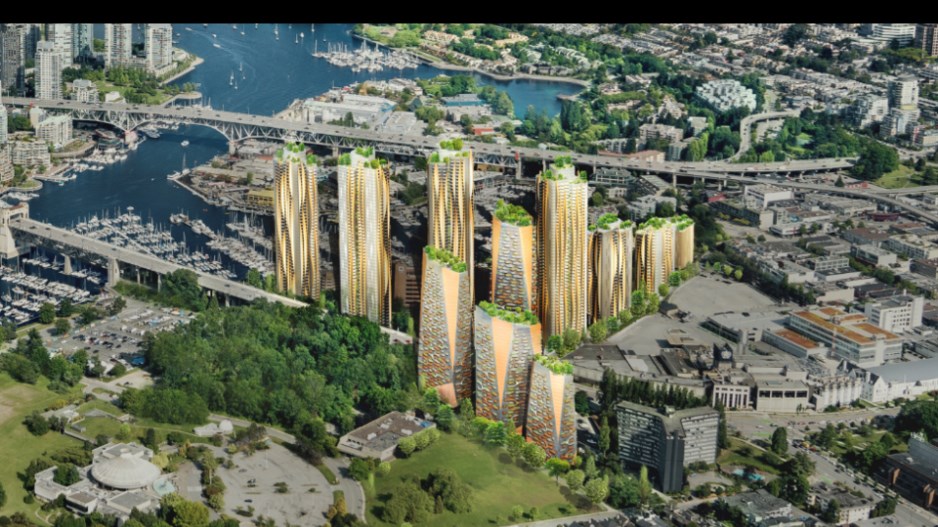Ian Gillespie, the Westbank Corporation CEO, accepted a token 50 cent payment from members of the Squamish Nation during a ceremony under the Burrard Bridge on Tuesday, where Prime Minister Justin Trudeau turned the sod to begin the four-phase, 11-tower Senakw condo project.
Squamish Nation members agreed to a 50-50 partnership in 2019 with Westbank to build 6,000 units on 4.7 hectares of Kitsilano Indian Reserve 6 regained through court settlements. Since then, Westbank’s share was reduced to 30% and OP Trust, the Ontario Public Service Employees Union and Government of Ontario pension fund, now holds 20%.
By 2029, up to 10,000 people could be living in the rental towers on either side of the bridge. A consultant’s estimate from 2019 suggested the deal could generate as much as $12.7 billion in cashflow for the band and developer.
Trudeau was accompanied by four cabinet ministers, Patty Hajdu (Indigenous services), Ahmed Hussen (housing), Marc Miller (Crown-Indigenous relations) and Jonathan Wikinson (natural resources). Before the start of their three-day cabinet retreat in Vancouver, Trudeau announced a $1.4 billion loan through Canada Mortgage and Housing Corporation to finance half the units, touting it as the largest loan in the Crown corporation’s history. CMHC spokesman Leonard Catling said the Rental Construction Financing Initiative is providing $668 million for phase one and $745 million for phase two. Program loans are on a 10-year term, fixed interest rate and up to 50-year amortization.
“While we cannot comment on the interest rate for any specific RCF loan, our interest rate generally is lower than alternative financing available in the market,” Catling said.
Senakw is marketed as the “largest net-zero residential project in the country,” but officials did not specify whether that would include the energy-intensive construction process or how many carbon offsets they would buy to achieve the goal.
After almost two hours of rituals and speeches, Trudeau took questions from reporters for 12 minutes. He dodged a question about Kitsilano Point residents concerned over construction noise, the building of an access road through Vanier Park and the impact of up to 10,000 new residents in such a small area.
“This investment, this creation of thousands upon thousands of new, affordable rental units, a number of them low income rental units, is going to make a huge difference in the lives of thousands of families, who will suddenly have the stability, the opportunity, the proximity to work,” Trudeau said. “That will be a big step forward for Vancouver in terms of taking off some of the pressures that are around on housing. And I know that this is a good thing for the city, for the province and for the country.”
Vancouver Mayor Kennedy Stewart signed an agreement in late May with Squamish Nation council chair Dustin Rivers, aka Khelsilem, to provide civic utilities and access to the construction site. That agreement was quietly released more than two months later, on the Friday before B.C. Day weekend. Because the Squamish Nation remains under the federal Indian Act, the development needed approval from several federal departments rather than city council. Squamish Nation talks with the federal and B.C. governments about self-government stalled after the 1995 signing of an openness protocol. The B.C. Treaty Commission website shows the Squamish Nation is only halfway through the six-step process.
In 1913, the province subverted the Indian Act, paid 18 family heads a total $200,000 to surrender Senakaw and forced them onto boats headed for other Squamish villages. Squamish Nation later claimed all of Kitsilano Point, but ceded 60 acres in a $92.5 million settlement with the federal government in 2000.
Gillespie, a Liberal Party supporter and proprietor of Trudeau’s preferred luxury hotel, the Fairmont Pacific Rim, sat beside NDP Vancouver-Point Grey MLA David Eby. Though the construction site is in the Vancouver-False Creek provincial riding, Eby is the frontrunner to replace John Horgan as Premier this fall. The Squamish Nation is a partner in the MST Development company with the Musqueam and Tsleil-Waututh nations in the Jericho lands project in Eby’s riding. Some of that land is proposed for an Olympic Village, if the NDP government backs the Canadian Olympic Committee bid for the 2030 Games and the International Olympic Committee chooses Vancouver next May.
Seated nearby were directors of the Squamish Nation’s economic development company, Nch’kay, including Mike Magee, former Mayor Gregor Robertson’s chief of staff, and NDP insider Joy MacPhail.
Senakw is the biggest federally-involved construction project on Squamish land announced by a Trudeau since April 1974.
Prime Minister Pierre Trudeau promised 48 years ago to build the Pacific Environment Centre and a Coast Guard Base across from Vancouver’s Stanley Park. The federal government took out a 71-year lease on 55 acres east of the Lions Gate Bridge on Capilano Indian Reserve 5.
Three months later, Trudeau led the Liberals to re-election. The plan began to unravel after Capilano Liberal MP Jack Davis, Canada’s first environment minister, lost his seat in the July 1974 election to Progressive Conservative Ron Huntington.
During the first 35 years of the lease, the federal government paid $124 million to Squamish Nation for the land, even though nothing has been built there. It was deemed contaminated in the mid-1990s because of its proximity to the Vancouver Wharves mineral port.




